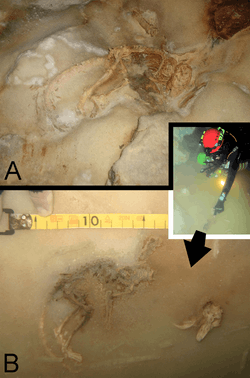Majorcan giant dormouse
| Majorcan giant dormouse Temporal range: Middle Pleistocene-recent | |
|---|---|
 | |
| Articulated skeletons of Hypnomys morpheus covered by flowstone found in the Cova des Pas de Vallgornera | |
| Scientific classification | |
| Kingdom: | Animalia |
| Phylum: | Chordata |
| Class: | Mammalia |
| Order: | Rodentia |
| Family: | Gliridae |
| Genus: | Hypnomys |
| Species: | H. morpheus Dorothea Bate, 1919 |
| Binomial name | |
| Hypnomys morpheus | |
| Synonyms | |
|
Eliomys morpheus | |
The Majorcan giant dormouse (Hypnomys morpheus) is an extinct animal from Majorca, Spain in Europe. It is considered an example of island gigantism. The closest extant relative is considered to be the genus Eliomys, which includes the garden dormouse.[1] It is believed to have been omnivorous,[2] and may have been terrestrial rather than arboreal. The arrival of humans on the island is believed to have been a major factor in its extinction.[3] H. morpheus was described by the palaeontologist Dorothea Bate in 1919. A 2011 study estimated its body weight as between 173 and 284 g, with a head and body length of 179 mm and a total body length of 295 mm.[4]
See also
References
- ↑ MC McKenna and SK Bell "Classification of Mammals Above the Species Level" 1997 Columbia University Press, New York ISBN 0231110138.
- ↑ Hautier, Lionel; Bover, Pere; Alcover, Josep Antoni; Michaux, Jacques (2009). "Mandible Morphometrics, Dental Microwear Pattern, and Paleobiology of the Extinct Balearic DormouseHypnomys morpheus". Acta Palaeontologica Polonica. 54 (2): 181. doi:10.4202/app.2008.0001.
- ↑ Bover, Pere; Alcover, Josep Antoni (2007). "Extinction of the autochthonous small mammals of Mallorca (Gymnesic Islands, Western Mediterranean) and its ecological consequences". Journal of Biogeography. 35 (6): 1112. doi:10.1111/j.1365-2699.2007.01839.x.
- ↑ Bover, Pere; Alcover, Josep A.; Michaux, Jacques J.; Hautier, Lionel; Hutterer, Rainer (2010). Goswami, Anjali, ed. "Body Shape and Life Style of the Extinct Balearic Dormouse Hypnomys (Rodentia, Gliridae): New Evidence from the Study of Associated Skeletons". PLoS ONE. 5 (12): e15817. doi:10.1371/journal.pone.0015817. PMC 3013122
 . PMID 21209820.
. PMID 21209820.
This article is issued from Wikipedia - version of the 8/1/2016. The text is available under the Creative Commons Attribution/Share Alike but additional terms may apply for the media files.